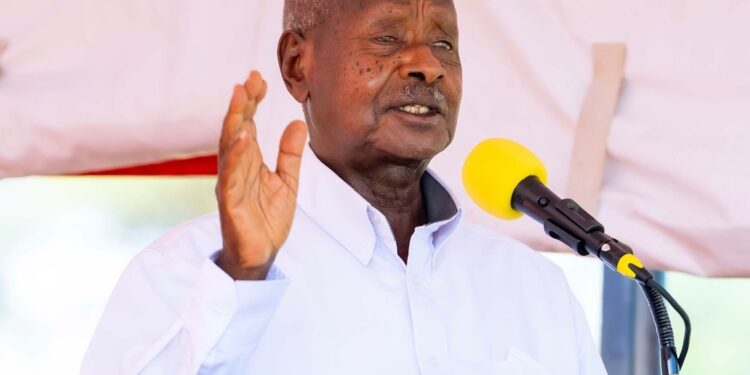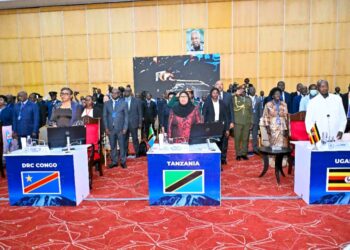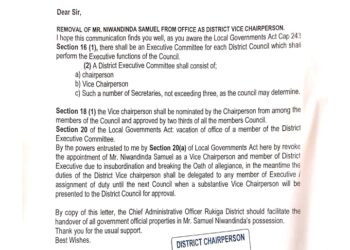President Gen Yoweri Kaguta Museveni has called on the Judiciary to intensify efforts in ensuring justice, combating corruption, and addressing the rising cases of land evictions as Uganda marked the opening of the New Law Year 2025 at the Judiciary Headquarters in Kampala.
On Friday while addressing a gathering of judicial officers, government officials, Members of Parliament, and members of the diplomatic corps, Gen Museveni congratulated Chief Justice Alfonse Chigamoy Owiny-Dollo and the entire Judiciary on successfully concluding the previous year and underscored the Judiciary’s critical role in fostering national stability and economic transformation.
He asked the judicial service, like all public service, to centre on the needs of Ugandans, regardless of their background. “Justice must be for all and should be administered without discrimination. The judicial services you render and the justice you administer must benefit our people,” he stated.
“As the three arms of government, we must work as a team, enhance efficiency through the adoption of technology, and set strategic, citizen-centric goals,” Museveni remarked. He also stressed the need for stronger collaboration among justice sector actors, including the Police, Office of the Director of Public Prosecutions (DPP), Judiciary, and local councils, to ensure effective service delivery.
A key focus of Museveni’s address was the growing problem of illegal land evictions and land grabbing, which he warned could derail the government’s poverty alleviation initiatives such as the Parish Development Model (PDM).
“I still receive complaints and witness incidents where evictions are not handled well. These unjust evictions will frustrate the efforts of farmers who have embraced PDM to grow cash crops like coffee, tea, and bananas or rear livestock,” Museveni said.
He urged judges and magistrates to be thorough in handling land disputes, ensuring that due diligence is followed before evictions are carried out. He also called on the Judiciary to develop comprehensive guidelines on land evictions to protect vulnerable Ugandans.
Museveni reiterated his government’s commitment to fighting corruption, particularly within the Judiciary. He noted that both Ugandans and foreign investors continue to face challenges when navigating the judicial system due to case backlogs, legal delays, and corruption.
“Ugandans and investors alike report significant challenges, including case backlogs, lack of transparency in legal proceedings, and difficulties in enforcing contracts. This has negative consequences on our economy and national development,” he said.
He commended the Judiciary for embracing digital solutions such as the Electronic Court Case Management Information System (ECCMIS) to streamline case handling but called for stronger supervision and inspection of courts to curb absenteeism, late-coming, and poor customer service.
“Corruption and indiscipline within the courts lead to delayed justice, which in turn hinders social and economic transformation. Let us see more supervision to ensure discipline in our courts,” he added.
Balancing Rights of Victims and Criminal Justice:
Museveni also raised concerns over the ease with which suspected criminals secure bail, questioning the Judiciary’s approach in handling cases involving serious crimes such as murder, land grabbing, and rape.
“Why do you at times protect thieves who are anti-development? Why do you make it so easy for thieves, murderers, land grabbers, and rapists to be released on bail? What about the rights of the victims and the broader community?” he questioned.
He reminded judicial officers that while the rights of suspects should be upheld, the Constitution also emphasizes the protection of citizens’ lives and property. He urged courts to strike a balance between constitutional provisions on bail and the need to uphold justice for victims.
Museveni highlighted the Judiciary’s broader responsibility in fostering economic growth, arguing that swift and fair dispensation of justice enhances investor confidence and contributes to national stability.
“The Judiciary plays a key role in shaping Uganda’s economic transformation. The courts serve as stabilizing forces, promoting social harmony and economic progress. Public interest should always be at the centre of judicial decisions,” he said.
He also encouraged the Judiciary to strengthen Alternative Dispute Resolution (ADR) mechanisms, which the Chief Justice has been championing, as a means of ensuring faster dispute resolution.
The President further emphasized the importance of public engagement, noting that the Judiciary should continue initiatives that bring legal services closer to the people. He urged judicial officers to use public outreach events to educate citizens about judicial processes and enhance legal awareness.
“When the wanainchi understand court processes, they will seek redress in courts instead of resorting to mob justice. Public education on legal matters is key to strengthening democracy,” he stated.
While assuring judicial officers of the government’s continued support, Museveni called for independence in the dispensation of justice, stating that interference in judicial processes must be eliminated.
He, however, reminded the Judiciary that Uganda has competing national priorities, including infrastructure development, healthcare, and education, and that the allocation of resources must be done wisely.
A Call for Swift and Fair Justice :
Gen Museveni also urged judicial officers to dispense justice fairly, promptly, and in a manner that reflects national interests. He emphasized that the Judiciary’s role extends beyond settling cases to shaping Uganda’s socio-economic transformation.
“A nation cannot thrive where there is no justice. The Government remains committed to improving access to justice by promoting user-friendly courts, reducing case backlogs, and ensuring timely dispensation of justice,” he said.
Do you have a story in your community or an opinion to share with us: Email us at editorial@watchdoguganda.com













